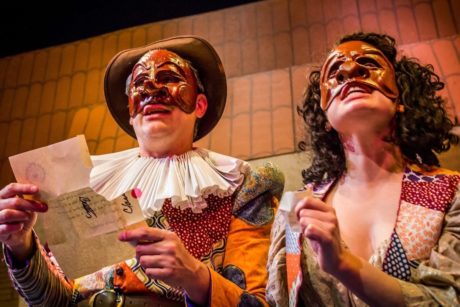This is the first of two interviews with Aaron Cromie, one of Philadelphia’s most beloved directors, mask makers, writers, and interdisciplinary theater artists.
Henrik: Carlo Goldoni (1707-1793), from childhood onward, could not be persuaded to do anything but play theater with his puppets and read and watch plays. Later, he ran away with a company of strolling players. When he was forced by his father to join a strict religious college, he spent most of his time reading classical comedies. How much does your childhood and youth resemble that of Goldoni’s?

Aaron: HA! Not really at all. My father and mother encouraged our artistic growth. I am the son of two public school teachers, and my father—a high school music and drama teacher—is responsible for my deep love of music and theatre. I used to spend every winter and spring break at his side as he taught the HS play and musical. I did see a lot of plays and musicals growing up. My father was also a church choir director—our whole family sang in the choir—and I sang in church services from grade school through college.
Goldoni started his career as a playwright composing a tragedy. However, it failed both financially and critically. Count Prata, director of the opera in Milano, told him that in France he could try to please the public, but in Italy he had to consult with the actors, the composers, and the stage decorators. In your experience, how would you describe the equivalency in America when directing a play today: pleasing the public or consulting with actors and the artistic team?
I don’t think there is any one method for creating theatre, nor do I think entertaining the audience while collaborating with the artistic team to be mutually exclusive. With a play like The Servant of Two Masters, we hope to delight the audience with an exploration of human folly and ridiculousness, but must rely on the vision of the many minds and talents in the room.
Goldoni, who lived in troubled times, surrounded by a corrupt elite, tried to feature the values of the rising middle class with their yearning for a progressive stand toward rationality, honesty, and humanism by mocking those in power—holding up a mirror. We, too, live in troubled times.

To be fair, as much as Goldoni was interested in the stories of the rising middle class, his stories often perpetuated the time’s existing tropes about the systems and distribution of power. In our production, we do make reference to the obvious Patriarchy of Goldoni’s time, which we can agree still exists today in our country and around the world. We hope to remind our audience how aware we are of this fact—with comedic acknowledgement.
Goldoni was influenced by the work of Molière that he loved and was taken by the strength of the commedia dell’arte. Given your studies with Antonio Fava, probably the most famous Italian mask-maker, author, and practitioner of commedia dell’arte in our own time, are you integrating elements of the Italian comedy that you are bringing to the Hedgerow through this famous Goldoni play?
Fava’s influence is apparent in my approach to the commedia movement and the speed of verbal wit. He is a very clever man, with a big robust laugh and voracious appetite for humor. He has a codified way of performing movement–training that I’ve received–though we take a lighter approach in this production: still physical, but really catering to the strengths of the performers. The masks I’ve designed are also inspired by the style that Fava makes. He was one of my design teachers and a big influence on how I make masks.
Goldoni, after a fight with Carlo Gozzi, an Italian playwright who accused him of having deprived the Italian theater of the charms of poetry and imagination, claimed that he was so disgusted by the traditional taste of the Italian public in theater that, aged 54, he left Italy for good and spent the rest of his life in France, writing his plays and memoirs in French . . .
. . . actually, a much longer story: Goldoni lost a bet with Gozzi, when Gozzi’s first play, The Love of Three Oranges, eclipsed the success of Goldoni’s offering. He left Italy in embarrassment, as Gozzi, though a proponent of classic theatre, had found a way to take the old and make it more spectacular than before: populist? yes, but more imaginative than what had come before.

Looking back at your own life, were there phases when you felt concerned, if not disgusted, by certain modes of theater in the U.S.? If so, what did you do to step away from the occasional polished mediocrity and come into your own as an innovative performer and director?
I think we live in a time when theatre is in constant competition with TV and Netflix, among other options for peoples’ time and money. Audiences will be drawn to what interests them, so I don’t fault any person who wants to see well-produced populist work. That work helps keep the art alive, entertaining audiences, and employing artists, designers, and technicians. That said, I don’t waste any time complaining about mediocrity.
Servant of Two Masters by Carlo Goldoni (1746) has been such a popular play that it has been translated into many languages and has been adapted and performed in many permutations. Which translation are you using and what changes, if any, have you made to make it accessible to a contemporary American audience?
Aaron There are several translations of the play with which I am familiar. I worked primarily from the main structure of the story and wrote my own version of the play—riffing, replacing and reworking things in a way that allows my sense of humor to play. I think that’s what the play seems to ask of its various interpreters. I also wanted to play with more recurring jokes and bits that reveal the characters’ comic histrionics, flaws, and humanity while capitalizing on the comic talents of the cast members.
Could you give an example or two of a traditional translation and how you riffed it and brought in your sense of humor in the Hedgerow production?
In traditional commedia, the lovers have on occasion used rhyming couplets in their dialogue. Goldoni didn’t employ that tactic in The Servant of Two Masters, and the translations I’ve come across don’t use it either, so I thought it would be fun to do it for the Hedgerow’s version and wrote some of their scenes using rhyming couplets.
Also, the dinner scene is one big, long lazzo [an “improvised comic dialogue or action in the commedia dell’arte”] which has to be constructed by the people doing it. So we set a basic structure, and then riffed from it to find what kind of wordplay and physical schtick would fit nicely. The ensemble helped to evolve it through many revisions.
Running Time: Two hours, including a 10-minute intermission.
The Servant of Two Masters, plays through June 26, 2016 at the Hedgerow Theatre Company – 64 Rose Valley Road, in Media, PA. For tickets, call (610) 565-4211, or purchase them online. Performance are on Fridays at 7:30 PM, Saturdays at 4:00 PM and 8 PM.
LINK:
‘Pushing the Envelope to Attract Contemporary Audiences: Goldoni at the Hedgerow Theatre: Part 2 of An Interview with Director Aaron Cromie by Henrik Eger.





